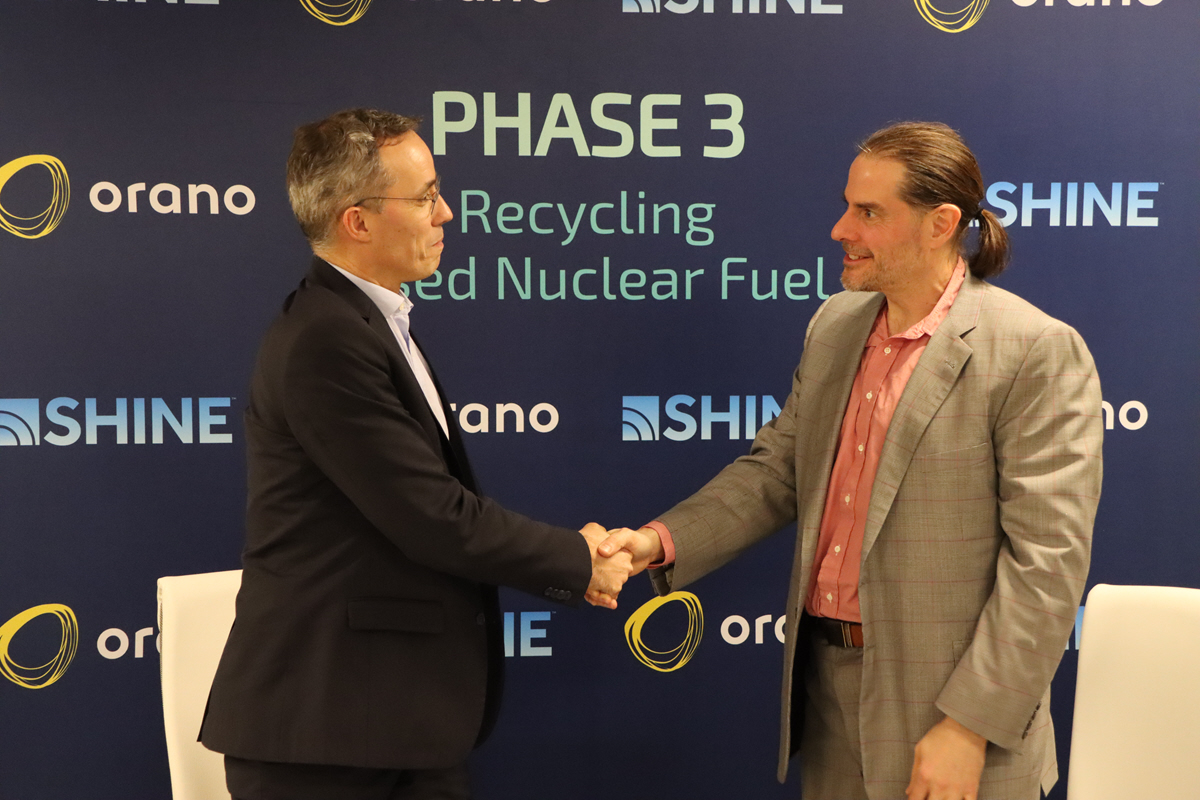
Orano and SHINE Technologies sign an agreement for the recycling of used fuel in the USA
On February 28, in Bethesda (Maryland), the Orano group, the recognized international nuclear materials operator, and SHINE Technologies, a U.S. company specialized in sustainable energy solutions, signed a Memorandum of Understanding with a view to developing a pilot plant in the USA implementing a technology for recycling used nuclear fuel from light water reactors.
The material recovered from the used fuel will be able to be re-used to fabricate new nuclear fuel for advanced and existing reactor designs. Certain radioactive isotopes extracted during the process could also be used for other industrial and medical applications.
With a processing capacity of 100 metric tons a year beginning in the early 2030s, the pilot facility will validate the innovative recycling process including the safety and nonproliferation measures.
It will combine the proven nuclear materials separation technology designed by SHINE Technologies with the operational and technical know-how deployed at Orano's La Hague site in France, where more than 40,000 metric tons of used nuclear fuel have already been reprocessed. Site selection for the pilot facility is expected by the end of this year.
The United States, originally one of the frontrunners in the processing and recycling of used fuel in the 1960s, ceased operations on the program in 1972. Since then, the U.S. nuclear industry has operated with used fuel storage remaining next to existing or prior nuclear energy facilities.
This agreement is thus a first step to contributing to the renaissance of an industrial sector for the processing and recycling of used nuclear fuel on U.S. soil.
In France, around 96% of the recoverable material (Uranium and Plutonium) contained in used fuel can be recycled to fabricate new fuels such as MOX1 and RepU2. The remaining 4% is final waste which is conditioned and placed in safe and stable interim storage on the la Hague site. In France, nearly 10% of nuclear electricity is generated from these recycled materials.
"I am proud of this partnership between Orano and SHINE Technologies, two companies aligned in the pursuit of a single objective: to recover the precious resource contained within used fuel to help to generate low-carbon energy in the USA", said Nicolas Maes, CEO of Orano. "For this project, Orano is bringing more than 55 years’ experience transporting, recycling and managing used nuclear fuel in France to the U.S."
“Our goal is to stand up an operational pilot facility by the early 2030s. While this is challenging, our track record with the Chrysalis facility shows that we know how to navigate the complex design, regulatory, and build aspects of 10 CFR part 50 nuclear facilities and do so cost-effectively. The lessons learned in the execution of that project are directly applicable to waste recycling, and uniquely position us for timely delivery on this important national priority,” said Greg Piefer, Founder and CEO of SHINE Technologies. “This agreement for closing the nuclear fuel cycle launches our company’s planned Phase 3 business along our path to ultimately achieving commercialized fusion energy.”
________________
1 MOX (Mixed oxide): fuel made from mixtures of uranium and plutonium oxides
2 Enriched Uranium (ERU) fuel: fuel made from reprocessed uranium from used fuel
________________

About SHINE Technologies
Headquartered in Janesville, Wisconsin, SHINE Technologies stands as an industry leader in next-generation fusion, deploying innovative fusion technology that seamlessly combines safety, cost-efficiency, and environmental responsibility. SHINE is at the forefront of creating non-carrier-added lutetium-177—a vital component in cutting-edge medical treatments.
SHINE’s commitment to innovation extends beyond the realms of industry and healthcare. Drawing on its fusion technology expertise, the company has set its sights on addressing one of energy's most complex challenges—nuclear waste recycling and fusion energy. With a comprehensive and visionary approach, SHINE is steadfastly driving advancements across multiple sectors, leaving an indelible mark on the domains of technology, healthcare, and sustainable energy solutions.
Contact
Press Contact
+33 (0)1 34 96 12 15
press@orano.group
Investors Contact
investors@orano.group